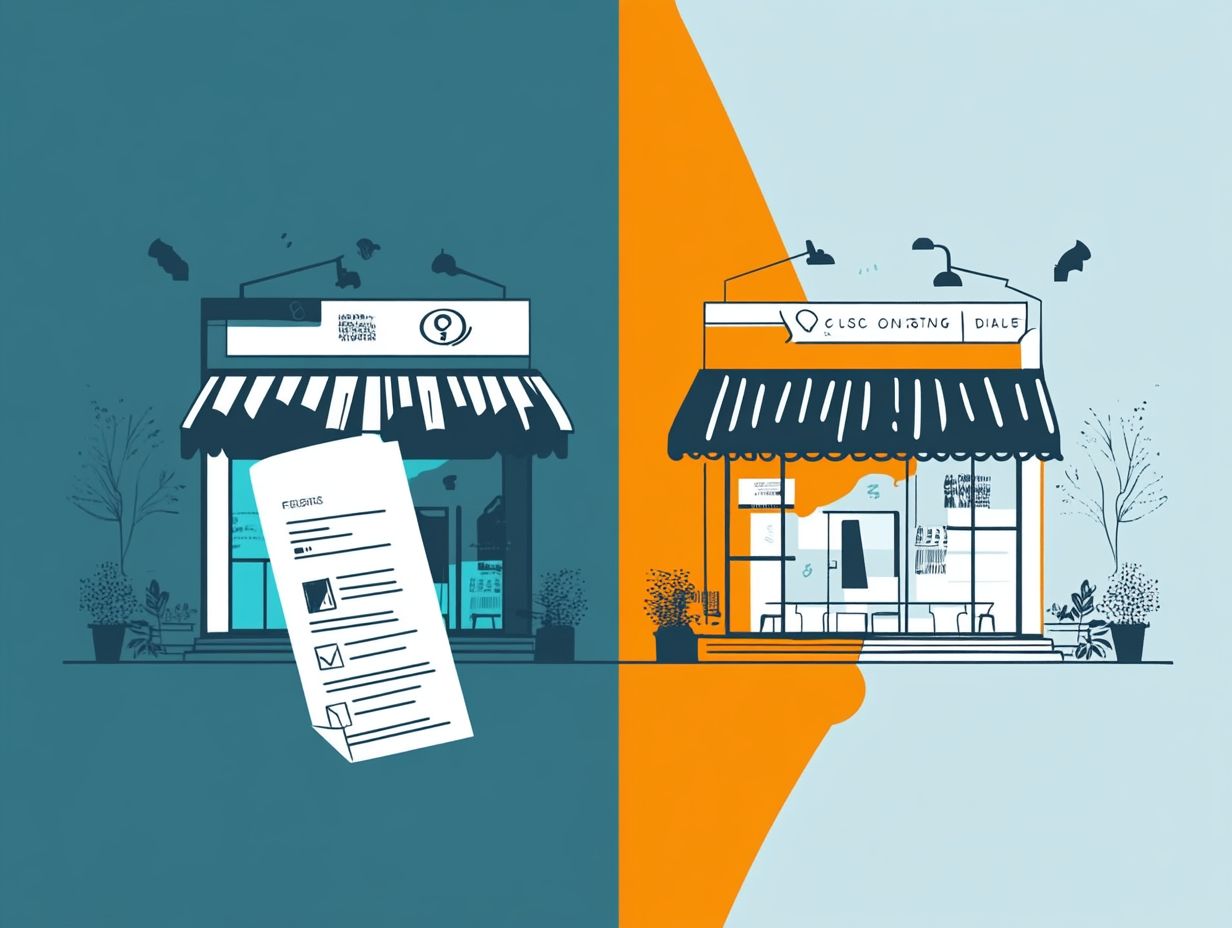Licensing Agreements vs. Franchising: Key Differences
When starting a business, understanding the differences between licensing agreements and franchising is essential.
These two models offer unique paths for entrepreneurs, each with its own ownership dynamics, financial implications, legal considerations, and brand strategies.
This article explores the key distinctions in ownership and control, financial aspects such as costs and profit-sharing, and the legal obligations inherent in these agreements.
By the end, you will have a clearer understanding of which model aligns best with your business aspirations.
Contents
- Key Takeaways:
- Defining the Terms
- Differences in Ownership and Control
- Financial Considerations
- What You Need to Know About Legal Aspects
- Brand and Marketing Differences
- Frequently Asked Questions
- What is the main difference between licensing agreements and franchising?
- What type of business models are typically associated with licensing agreements and franchising?
- How are the financial arrangements different between licensing agreements and franchising?
- What level of control does the licensor or franchisor have over the licensee or franchisee?
- What are the legal implications of licensing agreements and franchising?
- When is a licensing agreement better than franchising, and vice versa?
Key Takeaways:

Licensing lets you use someone else’s idea or brand for a fee. Franchising means operating under a well-known brand while following its rules.
In licensing, you have more control over your business, while in franchising, the brand owner maintains significant control. Understanding these financial differences will help you choose what fits your needs best.
Defining the Terms
Defining the terms related to franchising and licensing is crucial for anyone considering a business model involving shared roles, operational control, and financial commitments.
A franchise typically involves a franchisor granting a franchisee the rights to operate under an established brand, while licensing permits a licensee to utilize specific intellectual property.
Understanding these definitions helps you navigate potential legal risks and ensures adherence to industry standards, particularly concerning trademarks and franchise agreements.
Differences in Ownership and Control
The differences in ownership and control between franchisors and franchisees can significantly impact business operations and decision-making.
In a franchise setup, the franchisor maintains specific control limitations, setting brand standards and operational guidelines while allowing you, the franchisee, to oversee daily operations within a designated territory.
This setup creates a partnership where both parties share rights and responsibilities, which is vital for expanding your business.
Who Owns the Business?
Ownership within a franchise system is typically shared between you, the franchisee, and the franchisor, resulting in a unique dynamic in operational control. The franchisor retains ownership of the trademark and business model, while you own the franchise unit and manage its operations according to established guidelines.
This division of ownership brings specific responsibilities for both parties. You can expect the franchisor to provide comprehensive training and support to ensure brand consistency and protect intellectual property.
In return, your responsibilities include adhering to the operational standards set by the franchisor, safeguarding the brand’s reputation in your local market, and efficiently managing day-to-day business practices. This relationship can significantly influence your daily operations.
While you benefit from the support of a recognized brand and established systems, you also need to navigate legal obligations such as adhering to franchise agreements and local regulations balancing your autonomy with necessary compliance.
Level of Control and Autonomy

The level of control and autonomy you experience as a franchisee varies significantly from that of the franchisor. This variation influences how you conduct business operations.
Franchisors often impose brand standards and operational guidelines. While this may limit your autonomy, it helps maintain consistency across the brand.
This delicate balance is crucial for your decision-making processes. You must balance your need for independence while adhering to established protocols.
While operational guidelines preserve brand integrity, they can also stifle your creativity and responsiveness to local market conditions.
You may face tough choices, caught between following the franchisor’s directives and adapting your strategies to better serve your unique customer base.
This ongoing tension highlights the importance of effective communication and collaboration between you and the franchisor. Achieving shared success while upholding the brand’s reputation requires both parties working together harmoniously.
Financial Considerations
Understanding financial considerations is crucial when you enter a franchise agreement. This involves navigating costs, royalties, and profit-sharing mechanisms that shape the relationship between franchisor and franchisee.
Franchise fees can include initial setup costs and ongoing royalties. These factors significantly influence your financial obligations and play a vital role in determining the profitability and sustainability of your business model.
Costs and Fees
Franchising costs can vary widely. This variation can greatly affect your initial investments and ongoing expenses.
Typically, these costs include franchise fees, startup expenses, and other financial commitments you should consider before diving into a franchising opportunity.
The initial franchise fee acts as your entry ticket to a brand s established reputation, often ranging from thousands to hundreds of thousands of dollars.
Once you’ve crossed this initial hurdle, you’ll need to account for setup expenses. These generally cover equipment, inventory, and leasehold improvements necessary to kick off operations.
Ongoing royalties will also add to your regular financial outlay, influencing your profitability over time.
Understanding these various costs is essential. They collectively shape the overall financial viability and sustainability of your franchising venture.
Profit Sharing
Profit sharing in a franchise agreement typically involves a system where you pay a portion of your revenue to the franchisor. This financial obligation can significantly impact the overall profitability of your business operations.
For example, a standard royalty structure may require you to pay between 5-10% of your gross sales a common practice among fast-food chains and retail brands.
These percentages not only fund the franchisor’s ongoing marketing and development initiatives but also shape your financial landscape. Careful budget management is essential.
By understanding how these financial contributions work, you can navigate your business model more effectively. This comprehension helps you strike a balance between following franchisor guidelines and making profitable decisions that sustain your operations in a competitive market.
What You Need to Know About Legal Aspects

Navigating the legal implications of franchising demands a nuanced understanding of contract law and the specific legal considerations in franchise and licensing agreements.
These agreements serve as the foundation for defining the rights and responsibilities of both franchisors and franchisees. They also incorporate essential legal elements that shape their operational relationship.
It s crucial to grasp these intricacies to ensure a successful and compliant franchising experience.
Contractual Obligations and Protections
Contractual obligations and protections are essential components of franchise agreements. They set the legal foundation for your relationship with the franchisor.
These contracts clarify expectations and rights for both parties. They also offer crucial legal safeguards against potential disputes. Clearly defining specific responsibilities helps prevent misunderstandings that could develop over time, such as operational standards, marketing contributions, and adherence to brand guidelines.
The clarity provided by these obligations fosters a sense of security, allowing you to invest in your business ventures with confidence. These legal protections are important for keeping the brand’s integrity. They ensure that you uphold the values and reputation of the franchisor while still having the freedom to thrive independently.
A solid franchise agreement builds a strong foundation for success, benefiting both you and the franchisor in the long run.
Brand and Marketing Differences
In the realm of franchising, the distinctions between brand and marketing are fundamentally shaped by trademark ownership and the brand standards established by the franchisor. These elements are vital for fostering brand recognition and ensuring consistency across different franchise locations.
To cultivate consumer trust and loyalty, your marketing strategies must align seamlessly with these brand standards while effectively promoting the established brand.
Use of Trademarks and Branding
The use of trademarks and branding plays a pivotal role in franchising. It allows you, as a franchisee, to leverage the established brand recognition that comes with partnering with a franchisor.
Adhering to brand standards is vital for preserving trademark integrity. It ensures that your marketing efforts accurately promote the brand. This strategic alignment elevates the brand’s market presence and fortifies customer trust and loyalty.
By harnessing these recognizable trademarks, you gain increased visibility and credibility, significantly influencing consumer purchasing decisions.
Following the established brand guidelines is essential; any deviation could dilute the brand’s identity and disrupt the cohesive experience that customers expect.
Effective marketing campaigns that resonate with the franchisor’s vision create a unified voice. This amplifies the overall impact of your promotional efforts across various locations.
Frequently Asked Questions

What is the main difference between licensing agreements and franchising?
The main difference is the level of control and support that the licensor or franchisor has over the licensee or franchisee. In a licensing agreement, the licensor grants the right to use their intellectual property. In a franchising agreement, the franchisor provides a complete business model and ongoing support.
What type of business models are typically associated with licensing agreements and franchising?
Licensing agreements are commonly used for businesses with intellectual property, such as trademarks, copyrights, or patents. Franchising is often used for businesses with a proven concept or unique business model that can be replicated in multiple locations.
How are the financial arrangements different between licensing agreements and franchising?
In licensing agreements, the licensee typically pays a one-time fee or ongoing royalties to the licensor for the use of their intellectual property. Franchising agreements often involve a larger initial investment, as the franchisee pays for the rights to use the franchisor’s brand, products, and business model, as well as ongoing royalties.
What level of control does the licensor or franchisor have over the licensee or franchisee?
In a licensing agreement, the licensor usually has little to no control over the operations of the licensee. On the other hand, franchisors have more control over their franchisees, including the use of their brand and business model. They may also provide ongoing support and training.
If you have any further questions or want to explore franchising opportunities, feel free to contact us!
We invite you to share your thoughts or ask questions about franchising!
What are the legal implications of licensing agreements and franchising?
Licensing agreements are generally simpler and less regulated than franchising agreements.
Franchising involves more legal requirements, including disclosure documents and franchise laws, which protect both the business owner (franchisor) and the person starting a franchise (franchisee).
When is a licensing agreement better than franchising, and vice versa?
A licensing agreement can be a great choice for businesses wanting to grow their brand without the responsibility of ongoing support and training.
On the other hand, franchising works well for businesses with a successful model and the resources to assist franchisees in various locations.






